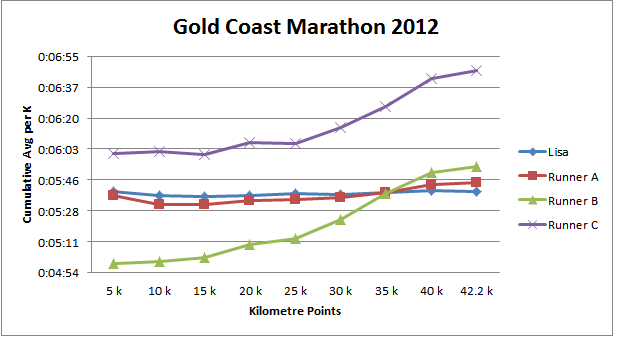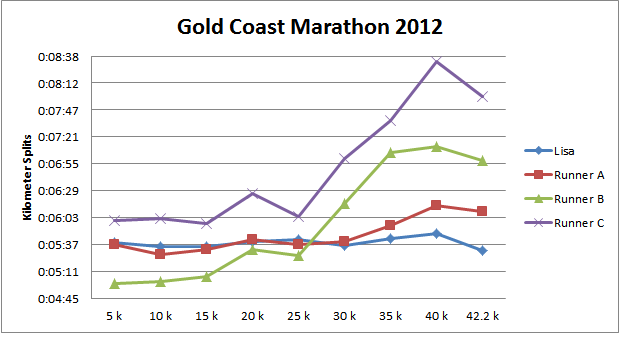Recently Lisa completed the Gold Coast marathon, here is my overview of her training and race and my thoughts on pacing a race.
Lisa had targeted the Gold Coast marathon well over 6 months ago with a target of beating her previous marathon time and a stretch goal of a sub 4hr marathon. After initial discussions I set about planning the training and Lisa set about completing the training. Throughout the training I continuously nagged about negative splits and pace control and I would biasedly say it was only in the last few weeks of training that I finally convinced Lisa that our race strategy would be to hold the same pace for the entire marathon (ie run even splits and not start out fast). I think the response was something like, “ok I’ll do it but you better be right!” I am obviously happy as Lisa achieved her sub 4 hours and stuck to the race plan perfectly. I love it when we achieve our goals by training hard and racing smart. I am a firm believer that on race day most people who don’t achieve their goals it is not from a lack of training (however this does apply to some) but more from incorrect pacing (and nutrition) on race day.
On looking at the results I noticed something very startling about pace control in the first 5k’s Lisa’s split was just over 53% in terms of ranking meaning that the majority of the field were running faster than her (and over the next 15k the majority of participants were running much faster than her), however in the last split she was at 20% in terms of ranking (meaning that her current pacing had moved up 33% in the rankings). What this tells me is the majority of runners got their pacing wrong and did not reach the potential that they had trained for. There is absolutely no benefit in running faster than your goal time and being “ahead” of time as by the end of the race you will have slowed that much that any gains will be lost with interest added! (my rule of thumb is if you are up 5minutes by half way, you will be behind by 10min at the finish.)
Whilst I will not go down the path of setting a time goal, but to say when you set a goal time it must be realistic and supported by training both in terms of endurance and interval (speed) work, there are many calculations out there to predict race times and most will give you a good indication, however pointless if the right training has not been put in place (I set goal race times by running time trials regularly throughout a training plan).
Back onto pace control, below is a graph of 4 runners in the marathon (3 random) and whilst I cannot comment on all of their training it can be seen that all 3 of these runners did not pace their races correctly with 2 of them blowing up drastically starting from 15k and the other one only marginally going too fast but still paid the price. Also 2 of the runners had been ahead of Lisa up until the 35k point and neither finished sub 4, but I am prepared to predict that both could have achieved this time with better pacing from the start. Hopefully you are still reading, my point is don’t put all your hard training to waste by not performing on race day, get your pacing right, train to it and race to it.
The first graph shows the cumulative avg splits as minutes per k, the second graph shows the actual split for each 5k, you will note in all 3 examples fatigue was creeping in between 15 – 20k, so not even at half way!

